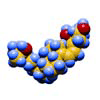Vitamin D (cholecalciferol)

Cholecalciferol (or Calciol for short), vitamin D3 is the physiologically occurring vitamin D in all non-plant eukaryotes and, accordingly, in humans. In food, it is mainly found in fish or added to food as a food additive. In the body, it assumes the function of a precursor and through an intermediate stage is converted into calcitriol. Vitamin D plays an important role in regulating blood calcium levels and bone structure. Vitamin D deficiency leads in the medium term to childhood rickets, and in adults to osteomalacia/osteoporosis. Since the 1990s, vitamin D has been shown to have functions in a variety of other tissues that include cell differentiation, inhibition of cell proliferation, apoptosis (cell death), immune modulation, and control of other systems. Vitamin D deficiency, according to the results of previous studies, is a risk factor for autoimmune diseases, such as multiple sclerosis, Crohn’s disease, diabetes mellitus type 1), infectious diseases, high blood pressure, cardiovascular diseases, metabolic syndrome, muscle weakness, dementia, Parkinson’s disease and disorders of the effective functioning of the brain. Vitamin D is protective against various types of cancer, such as breast cancer, leukemia, kidney cancer, ovarian cancer, and pancreatic cancer. In addition, vitamin D may reduce the number of falls in people over 65. Taking 700-1000 IU reduces the risk of falling by 19%.
Продукти съдържащи Vitamin D (cholecalciferol)
-
HYDROXYAPATITE DOLOMITE
73.00 €За здрави кости и зъби
-
OSTEOVITIS PLUS
40.00 €For bone and joint problems




 Subscribe for special discounts
Subscribe for special discounts Order by phone 0878 870 555
Order by phone 0878 870 555 100% satisfaction guaranteed
100% satisfaction guaranteed